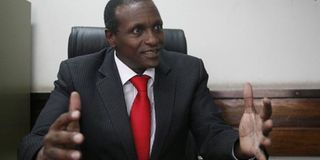Banks seek assurances in proposed roads plan

Director of Public Private Partnerships at the National Treasury, Mr Stanley Kamau. Mr Kamau Friday said tender evaluations for the plan to build 10,000 houses for civil servants had been done and bidders identified. FILE PHOTO |
What you need to know:
- The government will seek guarantees from the African Development Bank.
- The government has already announced plans to construct 10,000 kilometres through the new model by 2017.
Commercial banks planning to finance road construction want government to enhance the guarantee it is giving for the money loaned to contractors as way of lowering the financial risk.
Under a new system of financing, government plans to double the distance of tarmacked roads from the current 12,000 kilometres over the next five years.
Contractors who will be awarded the projects will get money from commercial banks, after which payment will be done through annuity concessions by government in a period of eight to 10 years.
“The banks are saying they cannot trust you (contractors) and they cannot trust us (government), which is why we want an independent party. There is uneasiness on how reliable the guarantee (by the government) is,” said the director of Public-Private Partnership unit at the National Treasury, Mr Stanley Kamau.
According to Infrastructure Principal Secretary John Mosonik, the government, however, said it will offer “letters of support” to assure the banks of prompt payment.
The government will seek guarantees from the African Development Bank.
“We are not issuing guarantees. What we are concerned with is what instrument to use to ring-fence cash flow. That is why we are holding discussions with banks so that when you (contractors) ask for Sh1 billion, they do not demand collateral,” Mr Kamau said.
WORKABLE MODEL
The government has already announced plans to construct 10,000 kilometres through the new model by 2017.
It is estimated that Sh260 billion will be spent to construct 2000 kilometres in the first phase which starts in January 2015.
Some 3,000 kilometres will be constructed in Phase Two and 5,000 kilometres in Phase Three. 49 contractors have so far been picked.
“The challenge is how to make financial institutions see things the same way. The challenge is that they have different risk profiles. In other countries, even competitors collaborate,” said Kenya Commercial Bank’s Regional Head of Investment Banking Mr Onchere Maiko.
Mr Mako said that PriceWaterhouseCoopers has developed a workable model according to which, several banks can form a lending consortium to minimise risk. Already, 25 banks have shown interest.
The new arrangement has a component of performance contracting where the government will pay for completed roads, rather than ongoing projects, as is the case currently.
The annuity payments do not begin until construction is complete, in accordance with quality standards set out in the contract.
Under the arrangement, the contractor is responsible for construction, operation and maintenance for 10 years.
“We have a bad history of guarantees. The challenge is striking a balance between the banks and the contractors. The consortium can take a fraction of the risk and the government the other,” said Mr Maiko.
The contractors also want the National Treasury to commit to pay on time to save them cash flow problems and possible trouble with auctioneers.
The local contractors are also concerned that they could be edged out by multinational companies who are able to access cheap funds abroad.
“These multinational companies are able to get loans at 3 per cent and pay at 5 per cent and all that they require is a letter from their embassy. We have to borrow at 18 per cent. The government has an obligation to protect local contractors,” said Mr Chege Kariuki, a contractor.
“Joint ventures between local and foreign companies is the way to go. This will enable small companies build their capacity. What is not right is to create business, and give 90 per cent to foreigners,” said a personality from the Kenya Private Sector Alliance who is, however, not authorised to speak to the media.





